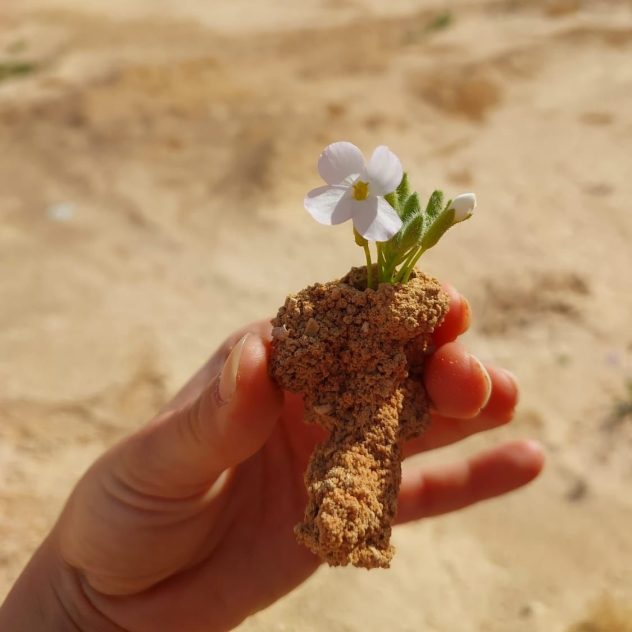
At the Arava Institute, we’re proud of our alumni, who continue to break barriers and create change long after they graduate. This week, we’re sharing the story of a Palestinian student* who came to the Institute looking for opportunity but left with a new path in environmental peacebuilding. Read on to hear how his experience shaped the way he thinks about peace, people, and the planet.
Q: Can you introduce yourself and tell us when you attended the Arava Institute?
I’m from Bethlehem, Palestine, and I’m currently a peace activist and water engineer. I attended the Arava Institute in the spring of 2022.
Q: What made you decide to apply?
That’s the most interesting part. The Arava Institute was my gate to the world. When I graduated from university, I was a civil engineer looking for a job in the West Bank. But it was really hard because the unemployment rate in the West Bank is very high. I applied for a visa to the U.S. but didn’t get it.
A friend asked why I didn’t apply for jobs in Israel—it has a strong economy, and I’d definitely get a job. But getting a work permit to enter Israel was basically impossible. At my age, as a single man, I was considered a terrorist by default by Israeli security. The only way to obtain a permit was through an educational institution.
I searched the internet for options and applied to the Arava Institute with zero interest in the environment or peacebuilding—I just wanted the permit that studying could provide. I got accepted, and when I left the West Bank, I was shocked when I passed the wall into Israel for the first time in my life.
When I first arrived, I was shocked that the Jewish Israelis didn’t have horns or tails like we’d been told when we were kids. This got me curious to meet more Israelis.
Q: What’s one memory from your time at the Institute that you’ll never forget?
When I went to orientation at the Institute, I became really good friends with an Israeli girl. We did everything together- hung out, ate, studied, went to the pool. I was one hundred percent sure that I’d seen her face before, but couldn’t place from where. She’s Israeli, I’m Palestinian. It was also my first time in Israel.
I had planned to stay at the Institute for a week, then leave and find work for the remainder of the time allowed by my permit. However, it was a month until I decided that I needed to leave. I packed my bag, and called her to say goodbye. We met at the gate and I finally asked her where I’d seen her before.
She responded, “I don’t remember seeing you and I don’t think there’s a chance we’d met before.” She said that she’d done her mandatory military service in the West Bank, in the same village where I am from.
That’s when I realized why her face looked familiar. I had seen it every day at the checkpoint near my village, where she would stop me from going to school or into the city center, making me wait for three hours with no explanation, only to tell me I couldn’t pass that day. And now, it was the same girl I was jumping into the pool with.
It was a shocking moment, but also a shifting moment. I told her where I was from and how I remember her face. She started to cry. I was feeling mixed emotions. This girl was the same one who would stop me and my family at the checkpoint every day, and now I was jumping into the pool with her. After we sat for a while, I said, “I don’t want your kids and my kids to meet each other at a checkpoint. I want them to meet at the Institute. So I’m not leaving.”
So we went back to the Institute and I unpacked my bags. This is how I got involved in the field of peacebuilding and the environment.
Q: After your time at the Institute, did you pursue other peacebuilding initiatives?
Since then, I’ve been involved with several peacebuilding organizations, including EcoPeace, Embodying Peace, the Wilson Center, and others. I’m proud of the connections I’ve made with Israelis and internationals who are committed to building a better future and seeing each other through the shared lens of humanity.
Q: What are you doing now? Do you stay connected with the Institute?
I’m pursuing my masters in water engineering. It’s all on Zoom, but they’ve been really cooperative and supportive. I’m working on my thesis topic now.
I’m still involved with the Institute and do a lot of activities as an alum of the Institute and other peacebuilding organizations. I have actually worked on the Institute’s recruitment team to bring more Palestinian students to the Institute.
Q: How do you attract Palestinian students to the Institute?
I tell them that this work is not normalizing this relationship to Israel; we’re not normalizing tanks, shooting, rockets, war, and conflict. We’re normalizing bringing people together.
Q: How do you see the Institute’s mission reflected in your daily life?
The Institute’s mission is deeply reflected in my life, which is why I’m pursuing my master’s. I took a course at the Institute on transboundary water management, and I saw how sharing the same water resource can bring different countries together. We have to share everything – if the people in Gaza are pumping their wastewater into the sea, that will affect Israel’s desalination plants. We need to protect our shared resources.
I remember when I visited Washington DC and I saw smoke in the air and they told me it’s from Canada. Nature really knows no borders. I realized that we can use the environment and natural resources as a starting point for peace.

